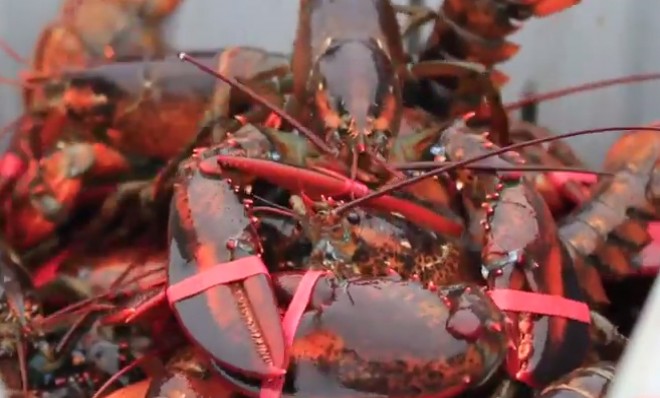Global warming is causing lobsters to become cannibals
Yes, too many lobsters is a bad thing

A free daily email with the biggest news stories of the day – and the best features from TheWeek.com
You are now subscribed
Your newsletter sign-up was successful
The waters off the coast of Maine are overflowing with lobsters, which, according to Mother Jones, is actually a bad thing.
Two main factors are causing the lobster population to explode. First, rising sea temperatures brought on by global warming are encouraging the crustaceans to grow quicker and reproduce more often, says Noah Oppenheim, a marine biology graduate student at the University of Maine.
Second, Oppenheim tells Mother Jones, over-fishing has rid the ocean of the lobster's natural enemies, which include cod, herring, and other fish.
The Week
Escape your echo chamber. Get the facts behind the news, plus analysis from multiple perspectives.

Sign up for The Week's Free Newsletters
From our morning news briefing to a weekly Good News Newsletter, get the best of The Week delivered directly to your inbox.
From our morning news briefing to a weekly Good News Newsletter, get the best of The Week delivered directly to your inbox.

Oppenheim tells Mother Jones that young lobsters left under his camera overnight are 90 percent more likely to be eaten by another lobster than by any other sea creature. That's a massive change from the 1990s, when similar experiments found that fish were usually the ones chowing down on lobsters.
This glut of lobsters is bad for just about everyone. As the lobster haul hit an all-time high of 126 million pounds in 2012, prices fell to $2.72 per pound, the lowest since the Great Depression. (Offshore water temperatures in Maine, coincidentally, have hit a century high). That is making it harder for Maine lobstermen to make ends meet.
For any seafood lover hoping this means buckets of cheap lobster, you might want hold off on melting that butter. That's because the low prices lobstermen get for their catch doesn't necessarily translate to low prices for the consumer.
Ideally for the consumer, lobster could be shipped across the country like chicken, meaning you could find lobster as readily in Iowa as on the coast of Maine. But as Slate's Matthew Yglesias explained last year, the fact that we like our lobsters fresh means they have to be transported alive in buckets of water, an expensive process that keeps the market clustered in the Northeast.
A free daily email with the biggest news stories of the day – and the best features from TheWeek.com
Ultimately, higher ocean temperatures could be bad for the creatures themselves. While they are in abundance now, New England saw a similar explosion in population in the 1990s, only to watch it crash. Warmer waters could also be a factor in lobster shell disease, a bacterial infection that can kill the animal.
Right now, lobstermen in Maine can only hope that resurgent predators or cooler waters will return to keep the population in check.
"It's a lot more work for the same money," Lyford Alley complains to Mother Jones. "We're just barely making it."
Keith Wagstaff is a staff writer at TheWeek.com covering politics and current events. He has previously written for such publications as TIME, Details, VICE, and the Village Voice.
-
 Crisis in Cuba: a ‘golden opportunity’ for Washington?
Crisis in Cuba: a ‘golden opportunity’ for Washington?Talking Point The Trump administration is applying the pressure, and with Latin America swinging to the right, Havana is becoming more ‘politically isolated’
-
 5 thoroughly redacted cartoons about Pam Bondi protecting predators
5 thoroughly redacted cartoons about Pam Bondi protecting predatorsCartoons Artists take on the real victim, types of protection, and more
-
 Palestine Action and the trouble with defining terrorism
Palestine Action and the trouble with defining terrorismIn the Spotlight The issues with proscribing the group ‘became apparent as soon as the police began putting it into practice’